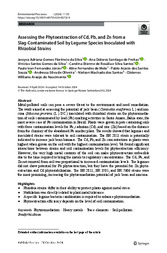Assessing the phytoextraction of Cd, Pb, and Zn from a slag-contaminated soil by legume species inoculated with rhizobial strains.
Assessing the phytoextraction of Cd, Pb, and Zn from a slag-contaminated soil by legume species inoculated with rhizobial strains.
Author(s): SILVA, J. A. G. F. da; FREITAS, A. D. S. de; SILVA, V. S. G. da; SANTOS, C. E. Ç de R. e S.; FERNANDES JUNIOR, P. I.; MELO, A. F. de; SOUZA, P. A. dos S.; OLIVEIRA, A. S. de; SANTOS, N. M. dos; NASCIMENTO, C. W. A. do
Summary: Metal-polluted soils can pose a severe threat to the environment and need remediation. The work aimed at assessing the potential of jack bean (Canavalia ensiformis L.) and mucuna (Mucuna pruriens (L.) DC.) inoculated with rhizobial strains on the phytoremediation of soils contaminated by lead (Pb) smelting activities in Santo Amaro, Bahia state, the most severe case of Pb contamination in Brazil. Plants were grown in pots containing soils with three contamination levels for Pb, cadmium (Cd), and zinc (Zn) based on the distance from the chimney of the abandoned Pb smelter plant. The results showed that legumes and inoculated strains were tolerant to soil contamination. The BR 2811 strain is potentially indicated to increase jack bean biomass. The Cd, Pb, and Zn concentrations in plants were highest when grown on the soil with the highest contamination level. We found significant interactions between strains and soil contamination levels for phytoextraction efficiency. However, the very high metal contents of the soil can make phytoextraction unfeasible due to the time required to bring the metals to regulatory concentrations. The Cd, Pb, and Zn net removal from soil was proportional to increased contamination levels. The legumes did not show potential for Pb phytoextraction, but they have the potential for Zn phytoextraction and Cd phytostabilization. The BR 2811, BR 3501, and BR 7606 strains were the most promising, increasing the phytoremediation potential of jack bean and mucuna.
Publication year: 2024
Types of publication: Journal article
Unit: Embrapa Semi-arid Region
Observation
Some of Embrapa's publications are published as ePub files. To read them, use or download one of the following free software options to your computer or mobile device. Android: Google Play Books; IOS: iBooks; Windows and Linux: Calibre.
Access other publications
Access the Agricultural Research Database (BDPA) to consult Embrapa's full library collection and records.
Visit Embrapa Bookstore to purchase books and other publications sold by Embrapa.

